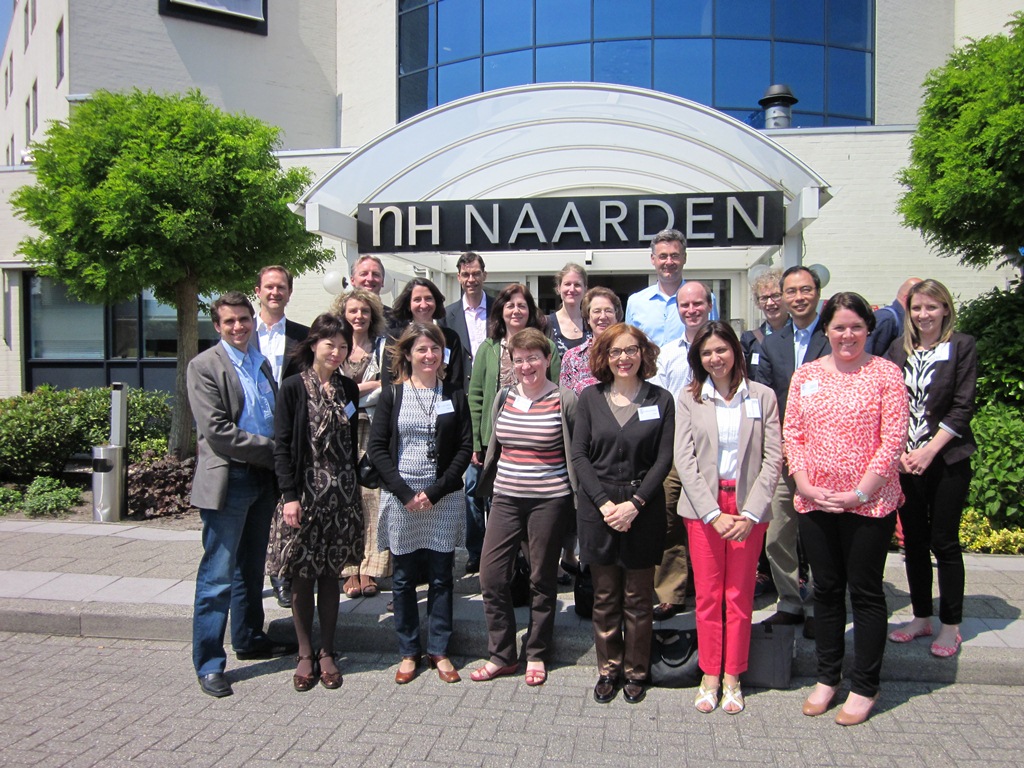FHL1 related myopathies: towards an FHL1 related myopathy consortium
- Number 199
- Date 6 June 2013
Location: Naarden
Twenty participants from 10 countries (Australia, Austria, Canada, Egypt, France, Germany, Italy, Japan, United Kingdom, USA) attended an ENMC workshop on the topic of “Four-and- an-Half LIM protein 1” (FHL1) related myopathies which include the diseases known as Reducing Bodies myopathies (RBM), X-linked scapula-peroneal myopathy (X-SPM), X-linked myopathy with postural muscle atrophy (X-MPMA), Emery-Dreifuss muscular dystrophy (EDMD6) and hypertrophic cardiomyopathy (HCM). Participants included biochemists, biologists, pathologists, molecular geneticists, neurologists, cardiologists, and paediatricians.
FHL1-related myopathies are a newly described group of neuromuscular disorders caused by mutations in the FHL1 gene, all first recognized over a brief period of time in 2008-2009. The spectrum ranges from severe and progressive early childhood forms to milder adult onset disease, often with important cardiac manifestations. The FHL1 gene is located on the X-chromosome and encodes for 3 isoforms of the protein, that are referred to as FHL1A, B and C. While FHL1A appears to be the more abundantly expressed form, the others are also expressed in both skeletal and cardiac muscle, but their precise respective roles are not yet clear.
The meeting covered a wide area of topics, ranging from the clinical presentations associated with FHL1mutations, muscle pathology, molecular genetics to the exploration of the molecular processes leading to the diseases.
The update of the different clinical phenotypes and their associated gene defects were reported by several participants and clearly highlighted two subgroups of diseases: one comprising RBM and X-SPM associated to mutations modifying the LIM2 domain of the 3 isoforms and leading to the occurrence of reducing bodies in the muscle biopsy, and the second comprising X-MPMA, EDMD and HCM associated to mutations modifying differently the FHL1 isoforms either by affecting the LIM3/LIM4 domain or by leading to truncated proteins. The participants clearly recognized the need for patient registry to better evaluate the natural history of these disorders and hence arrive at better proactive management of patients afflicted by an FHL1 related disorder.
Studies on the mechanisms linking FHL1 mutations to muscle and heart pathology were reported in animal models of the disease and in cell cultures systems reproducing patient mutations, at the moment focused on the major FHL1A isoform. These ongoing studies will be essential in identifying the molecular mechanisms and opportunities for therapeutic interventions in this newly recognized group of disorders of muscle.
The meeting succeeded in forming a new FHL1 related myopathies consortium, which then put into place, concrete steps towards a productive international clinical and scientific collaborative effort to accelerate progress across the entire nascent field.
A full report is published in Neuromuscular Disorders (pdf).

ENMC
Lt. generaal van Heutszlaan 6
3743 JN BAARN
The Netherlands
+ 31- 35-5480481
enmc@enmc.org
We may request cookies to be set on your device. We use cookies to let us know when you visit our websites, how you interact with us, to enrich your user experience, and to customize your relationship with our website.
Click on the different category headings to find out more. You can also change some of your preferences. Note that blocking some types of cookies may impact your experience on our websites and the services we are able to offer.
These cookies are strictly necessary to provide you with services available through our website and to use some of its features.
Because these cookies are strictly necessary to deliver the website, refusing them will have impact how our site functions. You always can block or delete cookies by changing your browser settings and force blocking all cookies on this website. But this will always prompt you to accept/refuse cookies when revisiting our site.
We fully respect if you want to refuse cookies but to avoid asking you again and again kindly allow us to store a cookie for that. You are free to opt out any time or opt in for other cookies to get a better experience. If you refuse cookies we will remove all set cookies in our domain.
We provide you with a list of stored cookies on your computer in our domain so you can check what we stored. Due to security reasons we are not able to show or modify cookies from other domains. You can check these in your browser security settings.
These cookies collect information that is used either in aggregate form to help us understand how our website is being used or how effective our marketing campaigns are, or to help us customize our website and application for you in order to enhance your experience.
If you do not want that we track your visit to our site you can disable tracking in your browser here:
We also use different external services like Google Webfonts, Google Maps, and external Video providers. Since these providers may collect personal data like your IP address we allow you to block them here. Please be aware that this might heavily reduce the functionality and appearance of our site. Changes will take effect once you reload the page.
Google Webfont Settings:
Google Map Settings:
Google reCaptcha Settings:
Vimeo and Youtube video embeds:
The following cookies are also needed - You can choose if you want to allow them:
You can read about our cookies and privacy settings in detail on our Privacy Policy Page.
Privacy Policy